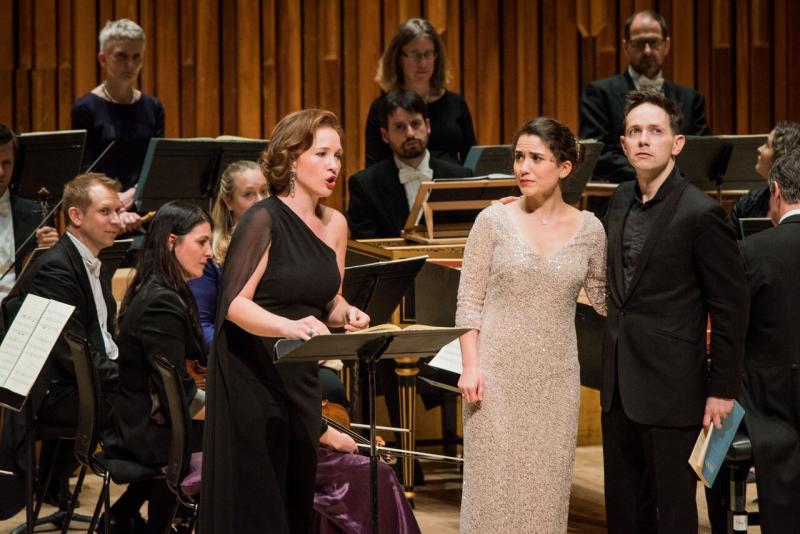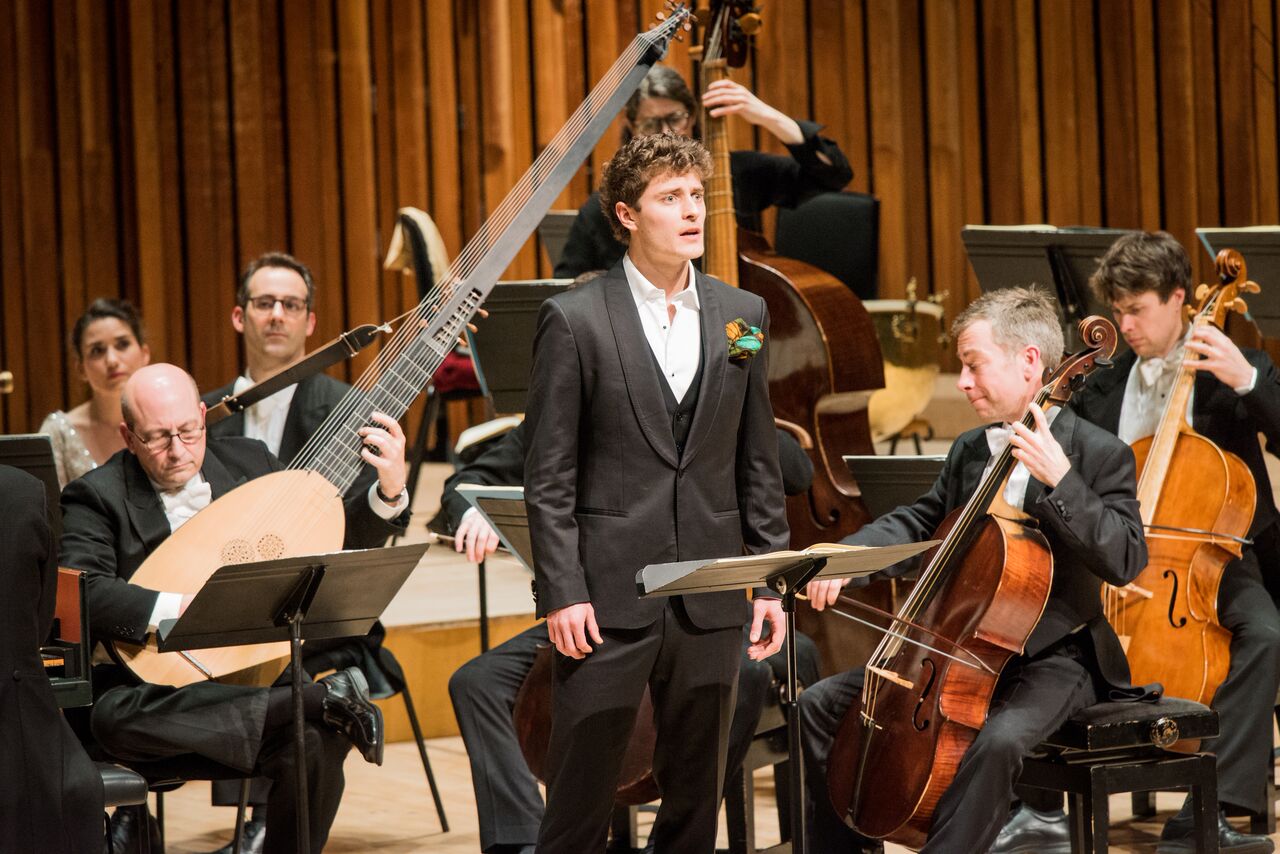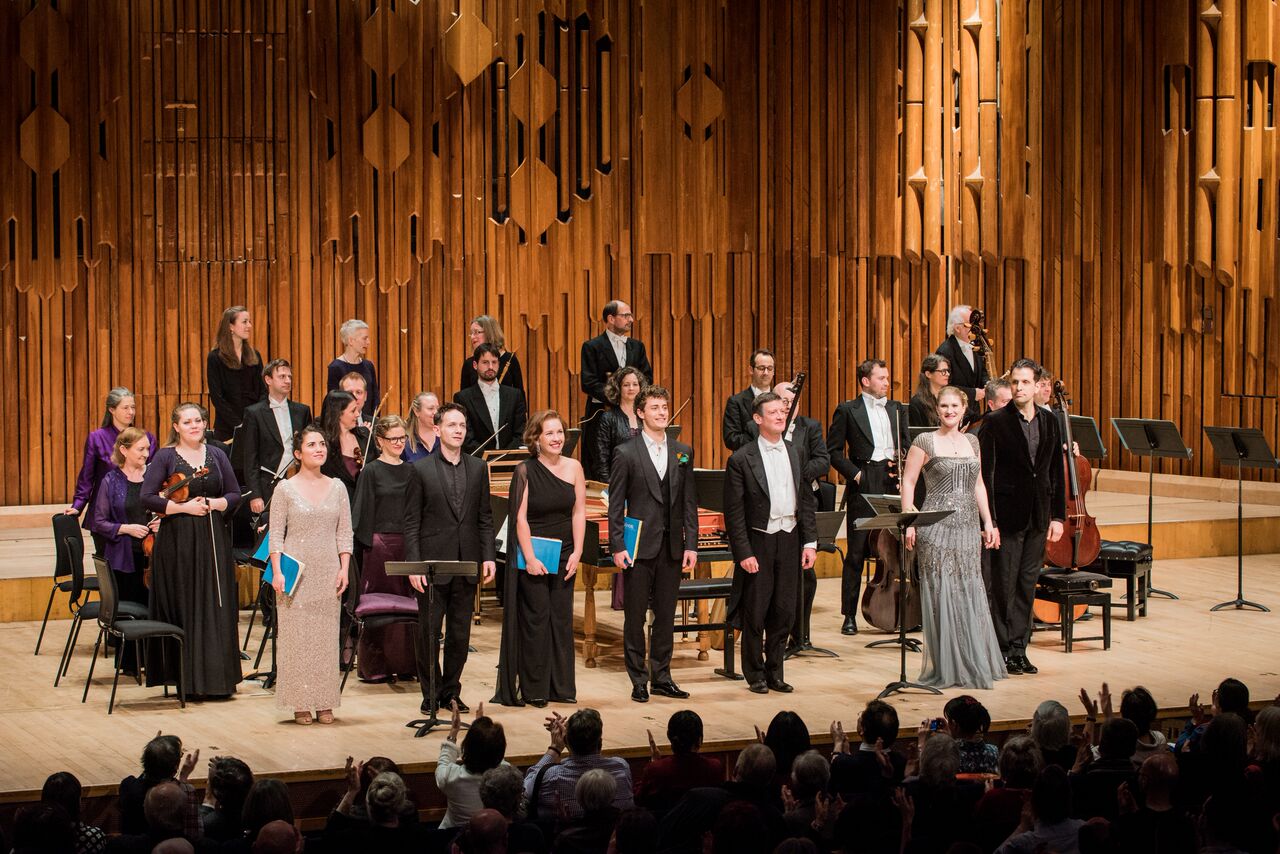Rinaldo, The English Concert, Barbican review - Bicket's band steals the spotlight | reviews, news & interviews
Rinaldo, The English Concert, Barbican review - Bicket's band steals the spotlight
Rinaldo, The English Concert, Barbican review - Bicket's band steals the spotlight
Handel's London opera still serves up the sensations 300 years later

It was the work with which Handel conquered London, the Italian opera that finally wooed a suspicious English audience to the charms of Dr Johnson’s “exotic and irrational entertainment”. Three hundred years later, neither Rinaldo nor London’s audience has changed much.
In the absence of the mermaids, fire-breathing dragons and live flock of sparrows that caused a stir in 1711, the thrills were strictly musical in this concert performance, but Bicket and his team are wizards of another hue, and their enchantments would have given any Armida a run for her money, with or without a Saracen army in tow.
First there were the trumpets – four of them – battering us with a fusillade of power and agility, setting the scene for Luca Pisaroni’s gloriously villainous entrance-aria “Sibilar gli angui d’Aletto”. Then it was the strings, announcing “Furie terribili” in a hot cloud of semiquaver sparks, before Tabea Debus coaxed liquid-throated loveliness from her recorder in the trilling, warbling obbligato for Almirena’s “Augelletti che cantate”, and cellist Joseph Crouch offered his delicate, rhetorical commentary to Goffredo’s “Sorge nel petto".  But that was all a mere preamble to Tom Foster’s harpsichord interludes in “Vo’ far guerra” – episodes Handel himself originally improvised, and which here bent the sonic drama into an entirely new shape, gleefully, wittily, impossibly surreal in their harmonic game of free-association. Who needs a flock of sparrows when you have the swarming agility of Foster’s counterpoint – an aural murmuration of staggering skill?
But that was all a mere preamble to Tom Foster’s harpsichord interludes in “Vo’ far guerra” – episodes Handel himself originally improvised, and which here bent the sonic drama into an entirely new shape, gleefully, wittily, impossibly surreal in their harmonic game of free-association. Who needs a flock of sparrows when you have the swarming agility of Foster’s counterpoint – an aural murmuration of staggering skill?
We’ve come to expect outstanding casts from these performances, but this one was notable not just for its established stars, but for a number of new names and less familiar faces. We don’t see nearly enough of mezzo Sasha Cooke in the UK, and while the role of patriarch Goffredo sits unhelpfully low in her register, the da capos did give us some tantalising glimpses of this syrup-rich voice. Recently signed by Warner, the 27-year-old Polish countertenor Jakub Jozef Orlinski (pictured above) is an exciting find, making an event out of Eustazio’s nothing of an aria “Siam prossimi”, and projecting his bright, light voice with ease in the Barbican’s awkward acoustic. Young British countertenor Owen Willetts also made a late impression as the Christian Magus.  Coloratura soprano Jane Archibald was all vocal thunderbolts and lightning flashes as Armida, holding her own against the polished theatrical creation that is Pisaroni’s slippery Argante – almost, but never quite, succumbing to pantomime. But Joelle Harvey’s Almirena refused to let the bad girl have all the fun, disarming any opposition with the restraint and simplicity of her “Lascia ch’io pianga”. If Iestyn Davies’s full-bodied “Cara sposa” felt like a missed opportunity for introspection and inwardness for the opera’s cardboard cut-out of a hero, his “Abbruggio, avampo, e fremo” and “Or la tromba” showed him at his best – spurring on the English Concert’s trumpets with his gilded breadth of tone and light-footed ease.
Coloratura soprano Jane Archibald was all vocal thunderbolts and lightning flashes as Armida, holding her own against the polished theatrical creation that is Pisaroni’s slippery Argante – almost, but never quite, succumbing to pantomime. But Joelle Harvey’s Almirena refused to let the bad girl have all the fun, disarming any opposition with the restraint and simplicity of her “Lascia ch’io pianga”. If Iestyn Davies’s full-bodied “Cara sposa” felt like a missed opportunity for introspection and inwardness for the opera’s cardboard cut-out of a hero, his “Abbruggio, avampo, e fremo” and “Or la tromba” showed him at his best – spurring on the English Concert’s trumpets with his gilded breadth of tone and light-footed ease.
If there were moments during the performance where Bicket’s ensemble swayed under pressure, some uncharacteristic smudges and tensions in the texture, these felt like a price worth paying for an evening of music-making that sustained something of the manic, improvisatory energy of Foster’s solos throughout – music-making that was anything but safe, rich in both risks and rewards.
Add comment
The future of Arts Journalism
You can stop theartsdesk.com closing!
We urgently need financing to survive. Our fundraising drive has thus far raised £49,000 but we need to reach £100,000 or we will be forced to close. Please contribute here: https://gofund.me/c3f6033d
And if you can forward this information to anyone who might assist, we’d be grateful.

Subscribe to theartsdesk.com
Thank you for continuing to read our work on theartsdesk.com. For unlimited access to every article in its entirety, including our archive of more than 15,000 pieces, we're asking for £5 per month or £40 per year. We feel it's a very good deal, and hope you do too.
To take a subscription now simply click here.
And if you're looking for that extra gift for a friend or family member, why not treat them to a theartsdesk.com gift subscription?
more Opera
 Albert Herring, English National Opera review - a great comedy with depths fully realised
Britten’s delight was never made for the Coliseum, but it works on its first outing there
Albert Herring, English National Opera review - a great comedy with depths fully realised
Britten’s delight was never made for the Coliseum, but it works on its first outing there
 Carmen, English National Opera review - not quite dangerous
Hopes for Niamh O’Sullivan only partly fulfilled, though much good singing throughout
Carmen, English National Opera review - not quite dangerous
Hopes for Niamh O’Sullivan only partly fulfilled, though much good singing throughout
 Giustino, Linbury Theatre review - a stylish account of a slight opera
Gods, mortals and monsters do battle in Handel's charming drama
Giustino, Linbury Theatre review - a stylish account of a slight opera
Gods, mortals and monsters do battle in Handel's charming drama
 Susanna, Opera North review - hybrid staging of a Handel oratorio
Dance and signing complement outstanding singing in a story of virtue rewarded
Susanna, Opera North review - hybrid staging of a Handel oratorio
Dance and signing complement outstanding singing in a story of virtue rewarded
 Ariodante, Opéra Garnier, Paris review - a blast of Baroque beauty
A near-perfect night at the opera
Ariodante, Opéra Garnier, Paris review - a blast of Baroque beauty
A near-perfect night at the opera
 Cinderella/La Cenerentola, English National Opera review - the truth behind the tinsel
Appealing performances cut through hyperactive stagecraft
Cinderella/La Cenerentola, English National Opera review - the truth behind the tinsel
Appealing performances cut through hyperactive stagecraft
 Tosca, Royal Opera review - Ailyn Pérez steps in as the most vivid of divas
Jakub Hrůša’s multicoloured Puccini last night found a soprano to match
Tosca, Royal Opera review - Ailyn Pérez steps in as the most vivid of divas
Jakub Hrůša’s multicoloured Puccini last night found a soprano to match
 Tosca, Welsh National Opera review - a great company reduced to brilliance
The old warhorse made special by the basics
Tosca, Welsh National Opera review - a great company reduced to brilliance
The old warhorse made special by the basics
 BBC Proms: The Marriage of Figaro, Glyndebourne Festival review - merriment and menace
Strong Proms transfer for a robust and affecting show
BBC Proms: The Marriage of Figaro, Glyndebourne Festival review - merriment and menace
Strong Proms transfer for a robust and affecting show
 BBC Proms: Suor Angelica, LSO, Pappano review - earthly passion, heavenly grief
A Sister to remember blesses Puccini's convent tragedy
BBC Proms: Suor Angelica, LSO, Pappano review - earthly passion, heavenly grief
A Sister to remember blesses Puccini's convent tragedy
 Orpheus and Eurydice, Opera Queensland/SCO, Edinburgh International Festival 2025 review - dazzling, but distracting
Eye-popping acrobatics don’t always assist in Gluck’s quest for operatic truth
Orpheus and Eurydice, Opera Queensland/SCO, Edinburgh International Festival 2025 review - dazzling, but distracting
Eye-popping acrobatics don’t always assist in Gluck’s quest for operatic truth
 MARS, Irish National Opera review - silly space oddity with fun stretches
Cast, orchestra and production give Jennifer Walshe’s bold collage their all
MARS, Irish National Opera review - silly space oddity with fun stretches
Cast, orchestra and production give Jennifer Walshe’s bold collage their all

Comments
You liked the harpsichord
I enjoyed the evening, and